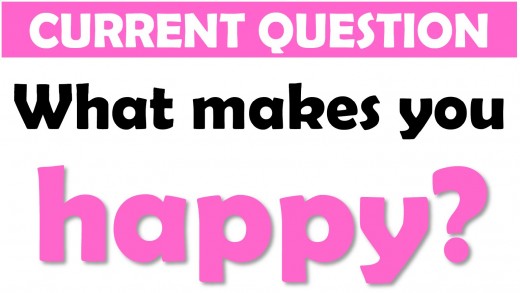- HubPages»
- Health»
- Mental Health»
- Emotions»
- Happiness
The Science Of Happiness-What can I do to be happier?
Positive Psychology: Shift from wrong to right
Positive Psychology is a recent branch of psychology that is intended to complement traditional psychology. It is defined as the scientific study of the strengths that enable individuals and communities to thrive. It emphasizes the importance of using the scientific method to determine how things go right rather than how things go wrong.
The term ‘Positive Psychology’ originates with Maslow, in his 1954 book ‘Motivation and Personality’. It finds its roots in the humanistic psychology, which focused primarily on happiness and fulfilment.
Positive psychology began as a new area of psychology in 1998 when Martin Seligman chose it as the theme for his term as president of the American Psychological Association. He is credited as the father of Positive Psychology for its efforts to scientifically explore human potential.
Happiness is one of the major topics of Positive Psychology. Positive psychology itself is defined by many as the study of happiness. Positive psychology studies people's happiness rather than diagnosing mental illness and treating what makes them miserable.
Why study Happiness? Benefits of Happiness
Researchers have linked happiness to the following:
- Happiness makes people feel good
- Happiness is good for one’s health
- Happiness is good for relationships: Happy people are more likely to get married and have fulfilling marriages, and they have more friends.
- Happy people are more productive at work and make more money
- Happy people are more generous
- Happy people cope better with stress and trauma
- Happy people are more creative
Tal Ben-Shahar, Positive Psychologist from Harvard University, has suggested the following relating to happiness:
- Real happiness requires both pleasure and meaning, providing both present and future gain
- Happiness is not an end state, but rather a journey
- The mind-body connection is important: Regular exercise, adequate sleep, and healthy eating habits lead to both physical and mental health
- Simplify: trying to do everything leads to "time poverty," which decreases the ability to derive happiness from any activity
- Pain and suffering are part of life: Expecting constant happiness is unreasonable and leads to disappointment; allowing oneself to feel the full range of emotions, including fear, sadness, and anxiety, increases happiness in the long run
- Gratitude increases happiness.

The World Happiness Report
The fourth report of The World Happiness, 2016 produced by the Sustainable Development Solutions Network (SDSN), a global initiative of the United Nations, takes into account six criteria: real GDP per capita, healthy life expectancy, having someone to count on, perceived freedom to make life choices, freedom from corruption, and generosity.
10 Happiest Countries In The World (The World Happiness Report 2016)
-
Denmark
-
Switzerland
-
Iceland
-
Norway
-
Finland
-
Canada
-
Netherlands
-
New Zealand
-
Australia
-
Sweden
10 Least-Happy Countries In the world (The World Happiness Report 2016)
1. Burundi
2. Syria
3. Togo
4. Afghanistan
5. Benin
6. Rwanda
7. Guinea
8. Liberia
9. Tanzania
10. Madagascar
What is Happiness?
What is happiness? All of us know what we feel when we are happy but it is often very difficult to define it and express in words. When you help a needy person or your friend it may make you feel happy. When you are in need of help and your neighbour helps you, that condition may also give you happiness.
What they said about happiness: Top quotes on happiness
"Happiness depends upon ourselves." - Aristotle
“Happiness is not something readymade. It comes from your own actions.”- Dalai Lama
“Most folks are as happy as they make up their minds to be.”- Abraham Lincoln
“Happiness is when what you think, what you say, and what you do are in harmony." - Mahatma Gandhi
“The best way to cheer yourself up is to try to cheer somebody else up.” - Mark Twain
“Happiness and sadness run parallel to each other. When one takes a rest, the other one tends to take up the slack”. - Hazelmarie Elliott
Sonja Lyubomirsky, positive psychology researcher, describes happiness as “the experience of joy, contentment, or positive well-being, combined with a sense that one’s life is good, meaningful, and worthwhile.”
Based on his research, Seligman finds three components of happiness:
- Pleasure / pleasant life (such basic pleasures as companionship, the natural environment and our bodily needs such as love, empathy, forgiveness etc.),
- Engagement / the good life (the depth of involvement with one's family, work, romance and hobbies) and
- Meaning / meaningful life (using personal strengths to serve some larger end such as humanism). Of those three roads to a happy, satisfied life, pleasure is the least consequential, and that engagement and meaning are much more important. Seligman’s theory perfectly bridges two contrasting views of human happiness, the individualistic view and the altruistic approach.
In sum, happiness has to do with the positive experience of emotions. It can be a pleasant feeling for a brief time or for a long duration. The key to defining happiness is positive emotions, but is does not means the absence of negative emotions. A "happy person" experiences range of emotions but the frequency by which they experience the negative ones may differ. Happiness is not only an emotion but refers to living a good life, experiencing well-being and enjoying good quality of life. Happiness is that feeling which comes over you when you know life is good and you can't help but smile.

What Makes Us Happy?
What makes you happy? This question is not as easy as it might seem to answer.
Most of us don’t always know what makes us happy. This may be due to a phenomenon called hedonic adaptation: the amount of pleasure we can get from the same experience tails off with repeated exposure. E.g. the first chocolate tastes much better than the last. We quickly adapt to whatever it is we think will make us happier and soon begin to take it for granted, at which point it no longer brings contentment.
Genes determines about 50% of our happiness. While a mere 10% can be attributed to differences in people’s life circumstances – that is, whether they are rich or poor, healthy or unhealthy, married or divorced, etc. This leaves a surprising 40% of our capacity for happiness within our power to change. (Lyubomirsky, Sheldon, et al., 2005)
Seligman found several factors to be more or less important in producing happiness. More important factors include sociability and religion while less important factors of happiness are money, illness, climate, education and intelligence.
Does wealth and all the delightful things that money can buy brings you happiness? Research by Diener has shown that once your basic needs are met, additional income does little to raise your sense of satisfaction with life. David Myers, a professor of psychology at Hope College, in Holland, Michigan, found that there is little correlation between cash and contentment.
Climate; sunny days? No. A good education? neither education nor a high IQ paves the road to happiness.
Youth? No, again. In fact, older people are more consistently satisfied with their lives than the young. Greater appreciations for life’s little triumphs and acceptance of life’s trials likely play a role, as well as lower stress level.
Marriage? married people are generally happier than singles, but that may be because they were happier to begin with.
Religious faith seems to genuinely lift the spirit, and thereby enhance happiness. It also gives meaning and purpose to life.
Friends? A giant yes. Social connection is key. Social connections are key to happiness. Social relationships and spending time with others makes us happy. Human beings are social creatures, and the quality of our relationships is inextricably linked with our happiness.
Develop strong social ties and make every opportunity to spend time with family and friends.

How Happy Are You? Can We Get Happier?
Happiness is extremely subjective and relative. What constitutes radiant joy for one person might not even rate as a good mood for another.
I’ll be happy when…I’m married to the right person.
I can’t be happy when…I’m single.
I’ll be happy when…I’m rich.
I can’t be happy when…the best years of my life are over.
The myths of happiness: beliefs that certain achievements (marriage, kids, jobs, wealth) will make us forever happy and that certain failures or adversities (health problems, divorce, financial struggles) will make us forever unhappy.
Researchers have shown that there is no magic formula for happiness and no sure course toward misery. Major life moments and crisis points can be opportunities for renewal, growth, or meaningful change. It is how we react to these moments that really matters.
Based on her research, Lyubomirsky has concluded that roughly 50 percent of happiness is determined by our genes and 10 percent by our life circumstance, but 40 percent depends on our daily activities.
Based on his study of happiness data on identical vs. fraternal twins, David Lykken concluded that about 50% of one's satisfaction with life comes from genetic programming. He also found that circumstantial factors like income, marital status, religion and education contribute only about 8% to one's overall well-being. He attributes the remaining percentage to "life's slings and arrows."
What influences our happiness the most? Are we all doomed to obey the directives of our genes? Sustainable happiness is attainable regardless of genetics, if one is prepared to do the work. Our intentional activities are much more important ; the things we choose to do with our time, our habits and our attitudes. Moreover, these are much easier to change.
Lyubomirsky proposes twelve intentional activities which are key to happiness:
1. Expressing Gratitude
2. Cultivating Optimism
3. Avoiding Over-thinking and Social Comparison
4. Practicing Acts of Kindness
5. Nurturing Social Relationships
6. Developing Strategies for Coping
7. Learning to Forgive
8. Increasing Flow Experiences
9. Savoring Life’s Joys
10. Committing to Your Goals
11. Practicing Religion and Spirituality
Based on reviewed of a wide range of cultures, Peterson and Seligman suggested six virtues which are considered good by the vast majority of cultures and throughout history. These traits can lead to increased happiness when practiced.
1. Wisdom and Knowledge: creativity, curiosity, open-mindedness, love of learning, perspective, innovation
2. Courage: bravery, persistence, integrity, vitality
3. Humanity: love, kindness, social intelligence
4. Justice: citizenship, fairness, leadership
5. Temperance: forgiveness and mercy, humility, prudence, self control
6. Transcendence: appreciation of beauty and excellence, gratitude, hope, humor, spirituality
We can’t alter our genetic set points. Changes in life circumstances don’t have a lasting impact on our happiness. The only thing that is left is what we actually do every day. What Sheldon and Lyubomirsky refer to as ‘intentional activity’.
Intentional activities are simply those cognitive, behavioral and volitional activities which we choose to do. They require effort but are free and accessible to everyone. Research proves that happiness is possible through intentional habit changes, more than circumstantial changes.
You Can Be Happier by Means of Intentional Activities
Positive psychology studies people's happiness scientifically rather than diagnosing mental illness and treating what makes them miserable.
Happiness can be a pleasant feeling for a brief time or for a long duration. The key to defining happiness is positive emotions, but is does not means the absence of negative emotions. It also includes living a good life, experiencing well-being and enjoying good quality of life.
We all want to live a happy and meaningful life. We are all capable of being happy. Research proves that happiness is possible through intentional activities. Lyubomirsky suggested such intentional activities as forgiveness, gratitude, strong social ties, optimism etc. to enhance our happiness.Thus the key to happiness involves establishing new healthy activities and to make them as a part of our habit.
Happiness is contagious. Through practicing happiness, we make those we come into contact with happier. But perpetual state of happiness is NOT simply possible. Unhappiness is actually an integral part of a full and rich life. The key is to strike a healthy balance between the two- happiness and unhappiness.








